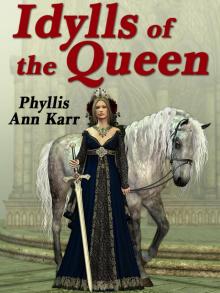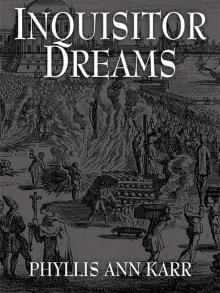- Home
- Phyllis Ann Karr
The Idylls of the Queen Page 12
The Idylls of the Queen Read online
Page 12
While helping me unarm, Gillimer took the chance to display his courtly tact. “It’s a good thing you waited to joust with a palsied graybeard, sir. My lord Bellangere the Proud might have killed you in the first fall.”
“Instead of making sport of the duke’s beard, you should pray you’re half the man he is at that age. If you survive so long. He had experience on his side. And luck.”
“You had luck, too. It was luck that his lance didn’t hold all the way through your shield and into your side, sir.”
“At least a craftsman made my shield, even if a lazy slackard, probably a kinsman of yours, made that rotten lance I was using.”
“You bore your shield very well, sir,” said Gillimer, as if he were an instructor and not a semi-competent student. “Strange, how shield-play seems to stay in a man’s arm longer without practice than does skill with a lance.”
“When you’re forty years older, you might know a little something of what you’re talking about. Until then, keep quiet and hide your ignorance.”
“Yet it’s odd how even the younger and less experienced knights have such good luck when they joust against you, sir.” Gillimer had begun as a coddled, over-sensitive page. He now had sensibilities of leather.
“Maybe you think you’re going to goad me into dubbing you to be rid of you,” I said. “Well, don’t look forward to that day until you’re sure you’re ready, because as soon as you’re knighted, I’ll teach you how to take twenty falls in a row, and it won’t be for practice. As it will be when we do it as soon as this present business is settled.”
He grinned and started whistling as he piled up my armor ready for the next day.
“You may think of yourself as another La Cote Male Taile or Gareth Beaumains,” I went on, “but at least they kept their tongues respectful until they were safely knighted.”
Not that I did not secretly prefer Gillimer’s honest disrespect to the silk-mouthed humility of another La Cote Male Taile or Gareth Beaumains, meek and undemanding, requesting no special consideration whatever—except that Arthur or Lancelot dub them knight on command, with no advance proof of their skill, training, or blood—and give them, while still untested, the first dangerous quest that offered.
La Cote Male Taile had at least announced at once that he was of good family, though he declined to go into full particulars, and had requested the accolade on the same day he arrived, with a story that he wanted to avenge his father’s murder (though, as it turned out, that pressing business had to wait until the new knight could indulge himself in a peripheral adventure or two). Gareth Beaumains, however, had not only come to court refusing to tell his name—which was understandable if all he wanted was to make his own reputation without relying on the fame of his older brothers—but almost insisting on spending a year in the kitchen as a scullion, as if all he wanted was food and drink and a place to keep his toes warm. That was carrying humility a little too far. What Beaumains was in fact doing was preparing a nice soft bed for himself. After starting as he did, he might have turned out a worse warrior than Meliagrant, and folk would still have called him a marvel: the scullion who could ride a warhorse and hold a lance, even if to no other purpose than to die like a knight.
Beaumains had had plenty of training and practice at home in Orkney, though he kept quiet about it; he must have known he was good enough with his weapons to have won a reputation without resorting to such tawdry Cinderella tricks.
The rumor started afterwards that Gareth or his mother Dame Morgawse had secretly revealed his identity to his uncle Arthur, or that Gawain had recognized him and kept the secret, telling only the King. In fact, Gawain, Agravain, and Gaheris had not seen their younger brother all the time he was growing to early manhood, and once at court he took care to avoid them as much as possible. Artus let my young knave of the kitchen go with Dame Lynette to rescue her sister because he took a dislike to her and thought it would be a good jest to play on a young shrew, Lancelot following to test Beaumains and take up the quest when the scullion proved unworthy. Even so, Artus probably felt a little ashamed of the trick he put on Lynette; at least, he made no attempt to stop me from going after Beaumains and testing him myself before Lancelot caught up with us.
What people overlook is that for every Gareth Beaumains or La Cote Male Taile or Percival de Galis who comes to us looking like a ragged tatterdemalion and turns out to be a fine man of arms and maybe even a prince in disguise, there are thirty who turn out to be ragged tatterdemalions whose only pretensions to skill at arms is in their daydreams. If we knighted all of them for the asking, we would have a court full of warriors stumbling over their own swords and asking each other the difference between greaves and cuisses, and all going hungry and rusty for lack of enough workers to till the fields and man the forges. Sometimes the petitioner is so obviously bumble-fingered that Arthur simply laughs and sends him back to his village with the price of a new cow; sometimes Gawain or Ywain or Lucan takes the fellow aside and quietly talks him out of it; occasionally, when the would-be knight is more attracted by the ideals than the actual arms, one of the bishops or chaplains recruits him for the clergy. But when the King is in one of his sportive moods, or when everyone remembers Gareth Beaumains, La Cote Male Taile, Tor the bastard of Pellinore, or Percival Pureheart, and decides that the present ragged robin from the ditches looks like another golden champion beneath the mud—hard work does develop hard muscles—then someone has to speak up and stop the farce. People forget the peasant lads who are sent home by the King or by a council of his knights acting in agreement. They also forget the ones who give up and go home after the seneschal is through with them, whether a tongue-lashing suffices or whether I have to administer a few buffets and bruises as well—sometimes I am the only man at court willing to demean himself by jousting against some ambitious buffoon that a page could unhorse with a toy spear. But the one time in twenty or thirty that the tatterdemalion turns out to be a fighter and gives the seneschal a fall—that, folk remember. Especially since the new prodigy stays around for years as a knight among knights and a constant reminder that Kay made another mistake. Not that Kay tested the candidate and proved him worthy, but that Kay played the churl again and was justly repaid for misjudging his man.
People also forget that for one Gareth Beaumains, the scullion who turned out to be a hero almost as great as Lancelot, the boy who sat in the kitchen for a year, pretending to be busy, making a mess of his work since he was as clumsy with spits and kettles as a true-born peasant is with swords and lances, screwing up his eyes to Heaven and acting like a meek, patient little martyr at every correction, and then turning on me for a bully at his first chance and, like a true mirror of chivalry, leaving me unconscious and bleeding with his lance head in my side while he rode off with my own lance and shield (and I had used to praise him when he showed off his strength throwing stones and bars in the yard, the one thing he proved himself good at during his year as scullion)—for one Beaumains, there are several score clumsy young loafers who never would learn their duties and keep to them without a measure of tongue-basting. The court may have laughed and cheered when Gareth Beaumains got his revenge on the rude-tongued bully of a seneschal; but they would not be so merry if their food came to them spoiled, meager, and badly cooked, their horses and hawks suffered from bad stabling and mewing, their various belongings turned up lost or broken due to bad packing for our moves from city to city, if the furniture was left cracked, records were mislaid, inventories inaccurate, and the court in general falling apart because the seneschal was going around careful to speak courteously and gently to every thick-fingered shirker of a servant who might have his feelings hurt by a rebuke.
CHAPTER 15
The Opinions of the Duke de la Rowse on Sir Ironside, Sir Astamore, and Others as Possible Poisoners
“So he departed, and by fortune he came to a mountain, and there he found a goodly knight that bade him, Abide sir knight, and joust with me. What are ye? said Sir Gar
eth. My name is, said he, the Duke de la Rowse. Ah sir, ye are the same knight that I lodged once in your castle; and there I made promise unto your lady that I should yield me unto you. Ah, said the duke, art thou that proud knight that profferest to fight with my knights; therefore make thee ready, for I will have ado with you. So they let their horses run, and there Sir Gareth smote the duke down from his horse. But the duke lightly avoided his horse, and dressed his shield and drew his sword, and bade Sir Gareth alight and fight with him. So he did alight, and they did great battle together more than an hour, and either hurt other full sore. At the last Sir Gareth gat the duke to the earth, and would have slain him, and then he yield him to him. Then must ye go, said Sir Gareth, unto Sir Arthur my lord at the next feast, and say that I, Sir Gareth of Orkney, sent you unto him. It shall be done, said the duke, and I will do to you homage and fealty with an hundred knights with me; and all the days of my life to do you service where ye will command me.”
—Malory VII, 32
De la Rowse was a sensible man. He admired Gareth as a fighter—the better you can consider the man who defeats you, the more honorable it makes your own defeat—but he did not adulate him to idolatry, as Bellangere the Proud adulated his dead conqueror Lamorak de Galis. That, and the fact that nobody considered Gareth of the Clean Hands likely to have poisoned anybody’s food, enabled us to discuss matters much more reasonably at Rowse Castle than we had at Arlan. We also managed to put off discussion of the serious news from court until after supper, when we had moved to the fireside in the duke’s chamber, where Mordred, having found a suitable gnarl of wood, began carving another of his ugly coiled serpents. At least I preferred seeing him do that to seeing him make straw poppets and toss them into the flames.
“You were here in the neighborhood during Ironside’s career of infamy, Rowse,” I said, after explaining the situation at court. “Do you remember any hint, any quirk in his character, any special act of treachery, to suggest the giant’s son might be capable of using poison to fulfill his old vow?”
“I thought Ironside fulfilled it already, years ago,” said the Duke. “Didn’t he have a joust and some swordplay with both Lancelot and Gawain for form’s sake before he joined your Table?”
“Yes, he fought them, among others, at the tournament our King held at Dame Lyonors’ castle,” said Mordred. “But a joust in friendship hardly fulfills a vow of vengeance.”
De la Rowse shook his white head. “When Ironside was the Red Knight of the Red Lands, he vowed to take vengeance on all King Arthur’s knights for the sakes of Lancelot and Gawain until he met one or other of those two. And to hang all those he defeated in the meantime, as I recall. I don’t remember that he actually vowed to kill Lancelot and Gawain, but only to hang them when and if he defeated them. Well, he fought them, and he didn’t defeat them, but he would have done all he’d vowed simply by meeting them in the field and fighting ‘em.”
“It was Lancelot he was really after, whether his former leman knew it or not,” said Mordred. “She knew that ‘the greatest knight of Arthur’s court had killed her brother,’ but she did not know which of the two greatest knights that was. Gawain does not ride in disguise. He bears his own shield whenever he can, and he tells his name on demand. He also remembers and reports very diligently all whom he has fought. Ironside’s lady would have known it beyond doubt if her brother had been slain by Gawain. Since she was not sure, it must have been Lancelot, riding anonymously again, except to let it be known he was Arthur’s man, and afterwards forgetting one or two of his casual victims among the crowd of killed, maimed, and wounded.”
“What matters,” said the Duchess de la Rowse, “is not which really killed the brother of Sir Ironside’s lady, but that neither the lady nor her knight knew for sure. However, it’s all done with long ago. I cannot think that Sir Ironside would decide all at once, after so many years, that his old vow had never been fulfilled.”
“It’s not unusual for Lancelot to disappear from court without leaving word,” I said, “but it’s an uncomfortable coincidence that someone tried to poison Gawain so soon afterwards. Maybe Ironside’s gone back to the side of the Sesnes.”
The duke beckoned a servant to pour him more ale. “Even if Ironside did cast in with his father’s people again, or develop a bad conscience about keeping his vow, he’d attack Arthur’s right-hand man openly. The only reason for keeping a vow is honor. A man wouldn’t use dishonorable means to do it.”
“The vow itself included shameful death,” said Mordred. “Someone may yet discover our brave Lancelot hanging by his noble neck from a tree, like Ironside’s forty conquests at Castle Dangerous. And poison is almost as shameful a death as hanging.”
“Maybe the words of that vow left Ironside a way to wriggle out from under it honorably,” I said, “but the spirit of the thing obviously meant, ‘Kill them.’”
“The words of a vow are the spirit,” said De la Rowse. For him, no doubt they were. He had yielded to Gareth and shifted his allegiance to Arthur as genially as he would no doubt have shifted it again to any other lord whose knight happened to conquer him in fair fight.
“Maybe,” I persisted, “but there was something very strange about that vow of Ironside’s. He had made it to his light-o’-love, but he was keeping it at the castle of another lady.”
“Ah, you men!” said the duchess. “And you accuse us women of over-much romancing. Why do you all assume the Red Knight of the Red Lands was besieging Dame Lyonors to make her wed him?”
“As I recall, the Red Giant himself told Gareth so,” said Mordred.
“Maybe he said that, knowing it was not like to happen,” replied the duchess, “but the truth of it was that Sir Ironside only set up at a castle to fetch the champions to him there, and he knew they’d come soonest to rescue a besieged, unwed lady. He did not break his heart for Dame Lyonors afterwards, did he?”
“No, but neither did he ever come forward with this former love of his,” I said. “A man who would hang forty knights for love of a dame should have loved her enough to go back to her.”
The duchess remained unperturbed. “Perhaps the poor dame died. Or perhaps he would not reveal her to the clacking tongues at court. Or perhaps she would not come, but broke with him of herself when he went over to her enemies.”
“Or perhaps,” I added, “she was a convenient story to excuse his murders, and never existed at all.”
“Why, in that case,” said the duchess, “likely as not he never made a vow against Lancelot and Gawain, either.”
The duke settled back in his chair. Ironside was no longer his problem neighbor, and his sovereign’s court was far away from his own life. “No, no, my lads, you’re scenting down the wrong spoor. Ironside was never a bad fellow, when all’s said and done. No, not even when he was the Red Knight of the Red Lands besieging pretty Dame Lyonors. He didn’t hang those knights up alive, y’know. Used to strangle ‘em on the ground if they weren’t already dead of their wounds. And he let all their squires go.”
“Very generous of him,” I said. The executioner would probably slip up, ten days from now, throw a cord around Dame Guenevere’s white throat, and strangle her at the stake before lighting the pyre, to be merciful.
Mordred glanced up from his carving. “What do you think of… say… Sir La Cote Male Taile as a poisoner, your Grace?”
The Duke blinked, leaving it to his wife to ask, “Sir La Cote Male Taile? But what malice would he hold against Sir Gawain?”
Mordred held his handiwork up, turning it between forefinger and thumb to examine it in the firelight. “Interesting, how because brother Gawain loves apples and pears, all folk assume the poisoned fruit was meant for him and not for another of us.”
“Certain of Gawain’s brothers,” I explained, “managed to kill Sir La Cote Male Taile’s brother Dinadan in a grudge battle during the Grail Quest.”
“Dinadan. Yes, yes, we’d heard he was gone.” The duke was sufficiently saddened to mot
ion for more ale.
“I think, though, that we had forgotten it,” said the duchess. “He’s a hard man to think of as dead and gone. So laughing and full of pleasant mockeries.”
In my mouth, Dinadan’s pleasant mockeries would have been called churlish sarcasm. But Dinadan had been as ready to laugh at himself as at anyone else, and never afraid to refuse a superfluous fight and be taunted for cowardice. “He had some sense,” I said. “Something besides long hair to keep his brains from rattling in his helmet.”
The duchess smiled. Being married to a man who had spent his life fighting for the sport of it at every opportunity, she could probably appreciate Dinadan’s good sense, though she had only met him the two or three times she and the duke came to court. “Sir Dinadan would hardly wish to be avenged with poison. He would return to haunt his avenger.”
“La Cote wouldn’t play the traitor anyway,” said De la Rowse. “He’d avenge his brother with lance and sword, the same way he avenged his father.”
“We were not all of us so enamored of Dinadan’s character,” said Mordred. “Nor has anyone been able to guess why La Cote Male Taile does not attempt to avenge his brother with honorable lance and sword, as he eventually avenged his father. True, he took a very great while avenging his father; but at that time he had to beg his knighthood first and then go in search of his father’s killers. His brother’s killers he has at hand, ready for him, and he is a knight already.”

 The Gallows in the Greenwood
The Gallows in the Greenwood At Amberleaf Fair
At Amberleaf Fair Frostflower and Thorn
Frostflower and Thorn The Fanciers & Realizers MEGAPACK
The Fanciers & Realizers MEGAPACK All But a Pleasure
All But a Pleasure The Idylls of the Queen
The Idylls of the Queen Frostflower and Windbourne (Frostflower & Thorn)
Frostflower and Windbourne (Frostflower & Thorn) Inquisitor Dreams
Inquisitor Dreams